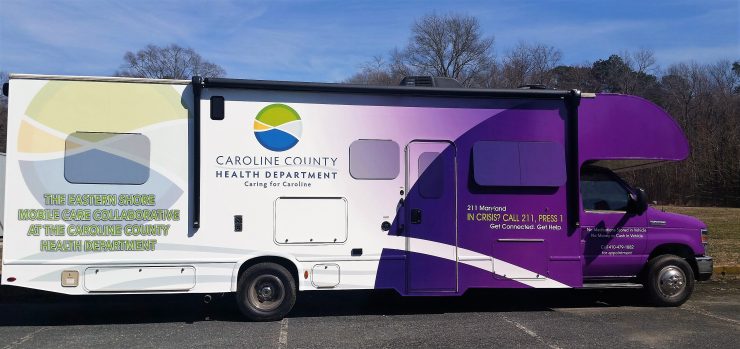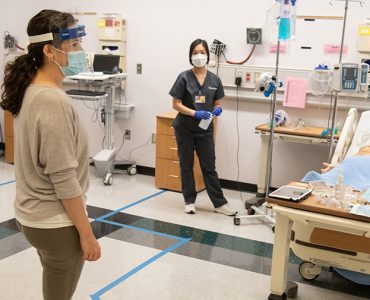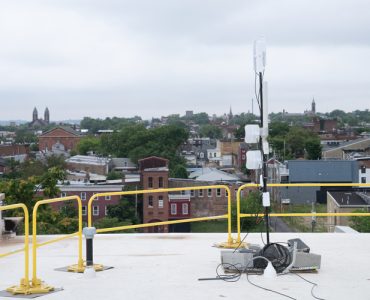Mary Kathleen Haber, a certified family nurse practitioner and health educator in Baltimore, had one hesitation when she began to work in primary care.
“I was terrified to treat people’s substance use disorder,” she recalls. “I had a personal history of family members who used drugs and alcohol, and I viewed it as a character flaw or a weakness.”
When she took a job at a Mount Vernon-based practice, she found that her colleagues were also timid about treating substance use disorder and, particularly, prescribing treatments like buprenorphine, a lifesaving treatment for opioid addiction. With time, she learned that there was adequate medication and counseling treatment for substance use disorder, and she began to see the patient as a person, not their disease.
When she decided to take on these patients, she did not do so alone. She connected with the University of Maryland School of Medicine’s (UMSOM) Maryland Addiction Consultation Service (MACS), where she could avail herself of phone-based guidance and web-based trainings.
“I took [MACS] at their word that I could call any time for any thing,” Haber says. “When you’re just learning buprenorphine, there’s a lot of fear around it. … I told myself I wasn’t on this path alone, I had this resource, and I was going to use it.”
A Lifeline for Practitioners Treating Patients with Addiction Disorder
About four years ago, UMSOM launched MACS to help primary care providers address the needs of their patients with substance use disorders and chronic pain management. Kelly Coble, LCSW-C, MACS program director, explains that patients are understandably more comfortable managing their substance abuse disorder with a trusted family doctor rather than going to a local treatment center (if one even exists). Yet these practitioners are often ill-prepared for the job.
“Most providers do not receive training in medical school or nursing school to take on behavioral health or opioid treatment,” Coble says. “For these practitioners, MACS has been a lifeline.”
A key component of MACS is its warmline. Providers like Haber can call with questions and connect quickly to an expert. The service is open to any provider — dentists, internists, nurses — and maintains the anonymity of the patient.
In addition to the warmline, MACS offers educational webinars, specialized services for expectant mothers, and technical assistance to help practices create addiction services administrative infrastructure. A program similar to MACS, DACS, was recently started in Washington, D.C.
MACS’ major initiative is to get more prescribers across the state waivered to administer buprenorphine. The Drug Addiction Treatment Act of 2000 (DATA 2000) requires qualifying physicians, nurse practitioners, and physician assistants to apply for and obtain a waiver to administer, dispense, and prescribe buprenorphine to treat individuals with opioid use disorder. MACS hosts monthly trainings in the waiver process as well as training to become confident in the safe administration of that treatment.
“Buprenorphine is the gold standard, evidence-based treatment for opioid use disorder, yet there are some counties in Maryland that didn’t have a single waivered prescriber,” Coble says. “When we first went into Caroline County [on the Eastern Shore], for example, there were no waivered providers; now there are several at the federally qualified health center there. We’re now preparing targeted waiver training outreach into Western Maryland. It’s all to the end of supporting an increase in the number of providers who can prescribe this lifesaving medication.”
Innovative Ways to Treat Addiction Disorders
MACS is one of several innovations initiated by UMSOM to address the state’s opioid and addiction epidemic. Overdose deaths skyrocketed with the introduction of the synthetic opioid fentanyl and have been exacerbated by the isolation and uncertainty of the COVID-19 pandemic. In 2020, there were 2,518 opioid-related deaths in Maryland; data for 2021 shows 1,217 deaths as of June. During the pandemic, there’s also been an uptick in the fatal use of cocaine and alcohol.
Baltimore has struggled with opioids since the heroin surge of the 1960s and 1970s, and UMSOM has developed a deep well of expertise and evidence-based treatment knowledge to work to address the problem. Now, that knowledge is expanding to help a wider geography.
Eric Weintraub, MD, professor of psychiatry and director of the Division of Addiction Research and Treatment, and his colleague Chris Welsh, MD, associate professor of psychiatry, began a program in 2015 to use telemedicine consultations at treatment centers in remote areas of the state to facilitate counseling and buprenorphine prescribing. That program now operates in six counties.
In 2020, the program expanded into several county detention centers. Inmates are 70 percent more likely to overdose after release, so it is essential to maintain or initiate treatment while they are incarcerated.
Despite these efforts, there are still patients in rural areas unable to get care.
“The linchpin of every substance abuse program is increased access,” Weintraub says. “You might think a 20-minute drive to a treatment center is no big deal, but if you have no car and no public transportation, it is.”
Utilizing a federal grant, the program added a mobile unit to bring services to small towns in Caroline County. The van has seen over 200 patients since 2019.
“The van was a critical component to treat patients in Caroline County during the pandemic, especially when the brick-and-mortar health departments had to shut down,” Weintraub adds. A new, larger van will soon expand mobile services to more counties and add screening and treatment for HIV and hepatitis.
Expanding Services During the COVID-19 Pandemic
During the pandemic, services also expanded at the University’s Drug Treatment Center in Baltimore City. Additional funding made it possible to add wraparound services for participants in drug treatment, like primary care, wound care, and social work.
“We felt we could decrease utilization of the emergency room services if those enrolled in our substance use programs could get care in our building,” Weintraub says. “We’re trying to increase access to lifesaving, evidence-based treatment and to integrate other services so patients get the best health care they can.”
Weintraub and Welsh are consultants at MACS. Welsh explains that they not only bring decades of knowledge to the work, they also change how providers think about addiction.
“For a long time, addiction treatment has been taken out of medical training and mainstream medicine,” Welsh says. “We provide knowledge and also model for them how not to stigmatize or judge people with substance disorders.”
Haber says MACS completely changed the way she approaches the addiction treatment she once feared.
“Through MACS, I’ve changed what I’m treating,” Haber states. “I’m treating a chronic disease, people who are deserving of high-quality care without stigma. They are people first, they are not their disease.”
By using the online training, she’s also connected with colleagues from around Maryland.
“It can feel like you’re fighting a war on your own,” she says. “When you join MACS, you feel part of something more than just yourself. You feel part of a statewide initiative to deliver lifesaving care to people who need it.”




